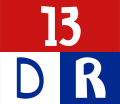Top Qs
Timeline
Chat
Perspective
Revolutionary Directorate of 13 March Movement
Cuban activist group during the Cuban Revolution From Wikipedia, the free encyclopedia
Remove ads
Directorio Revolucionario 13 de Marzo was a Cuban activist group in the Cuban Revolution. They attempted an assassination on Batista, the dictator of Cuba at the time, in 1957.

Remove ads
History
Summarize
Perspective
The DR-13-M, at the time just called “Directorio Revolucionario” (DR), was founded in 1954 as a Catholic student group opposed to the Cuban dictator Fulgencio Batista,[1] defining its principles as political liberty, economic independence, and social justice.[2] For a student group, the DR-13-M made military contributions to the Cuban Revolution by focusing on targeted plans.[3]
In 1957, the group coordinated an attack on Batista's Presidential Palace organised by DR-13-M leader José Antonio Echeverría, who died the same day in a related incident, and the opening of a second front in the Escambray Mountains, which was taken over by Che Guevara.
The death of Echeverría and other leaders led to the virtual collapse of the group, and its remaining membership largely joined the Escambray front under the leadership of the 26th of July Movement.[2] After the death of Echevarría, the leadership passed to Faure Chomón and Rolando Cubela Secades in the urban underground and the Escambray Mountain insurrection, respectively.[4]
The DR-13-M's "Escambray Manifesto" of 24 February 1958 envisaged simultaneous urban and rural guerrilla warfare against Batista. It called for the restoration of the Constitution of 1940, and for social revolution, while attacking "those who only a few years ago supported the Nazis in the conquered lands of Europe". As the manifesto circulated throughout the island, the Escambray guerrillas gained strength.[5]
Remove ads
Gallery
- Another flag used by the DR-13-M
References
Wikiwand - on
Seamless Wikipedia browsing. On steroids.
Remove ads





